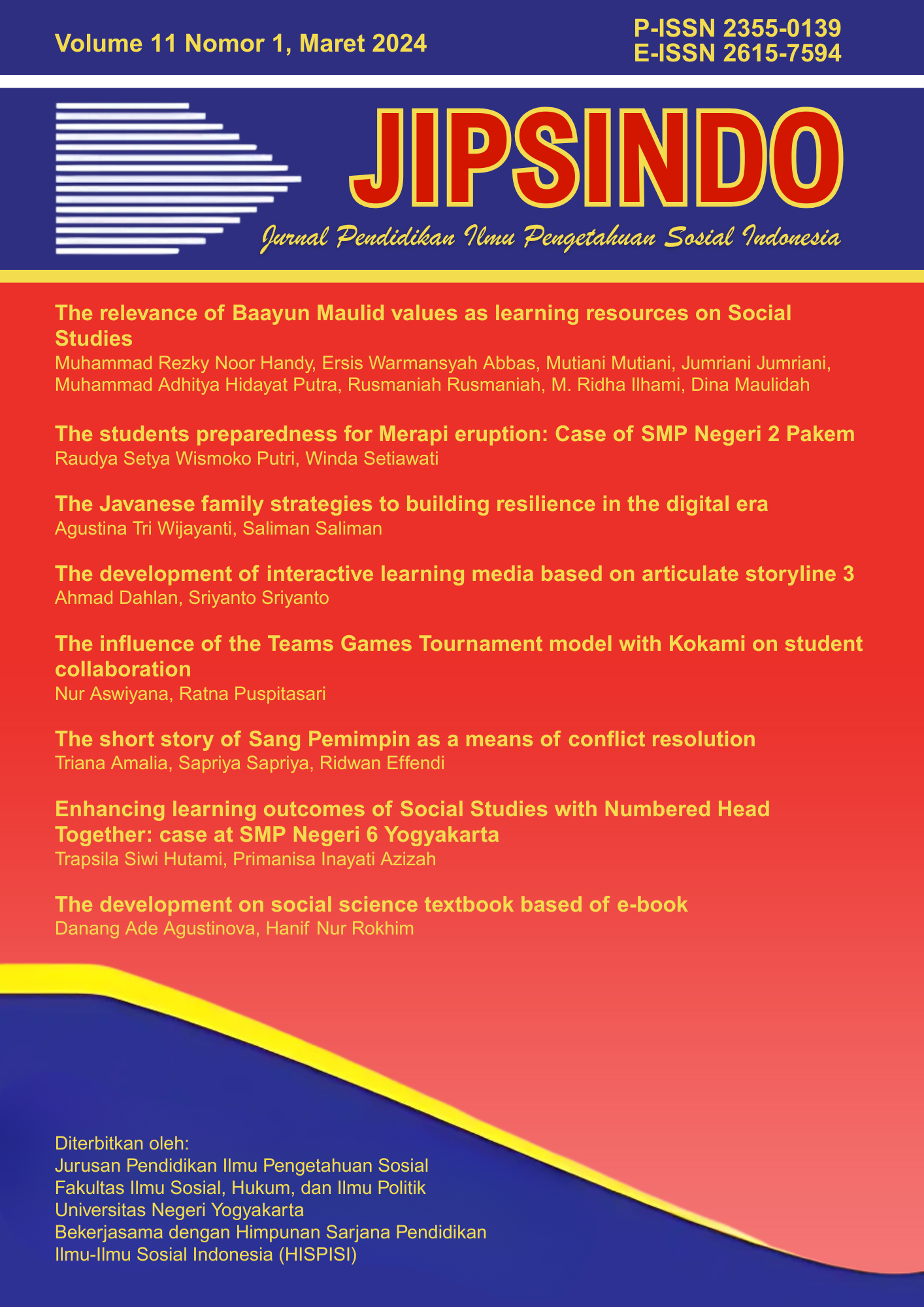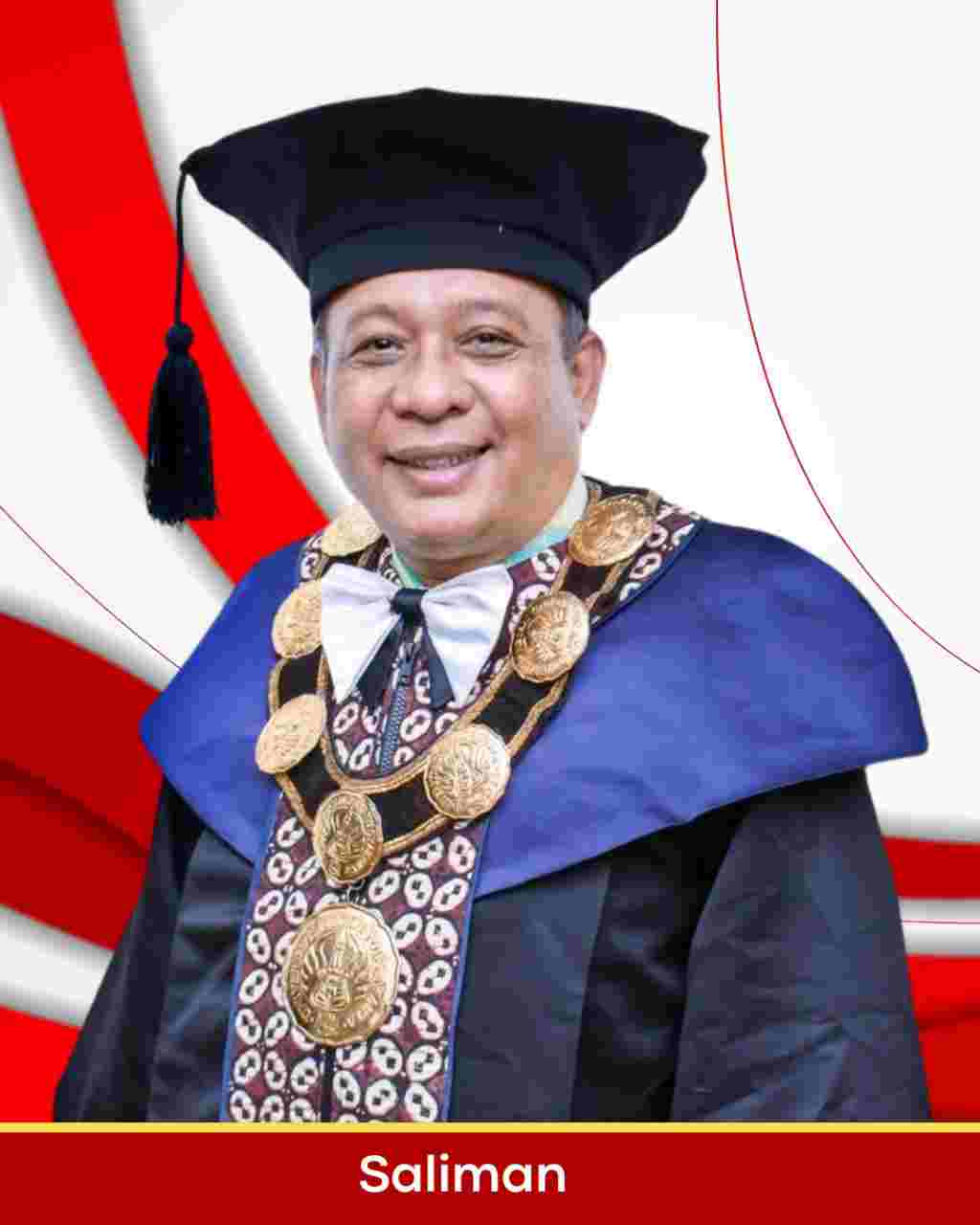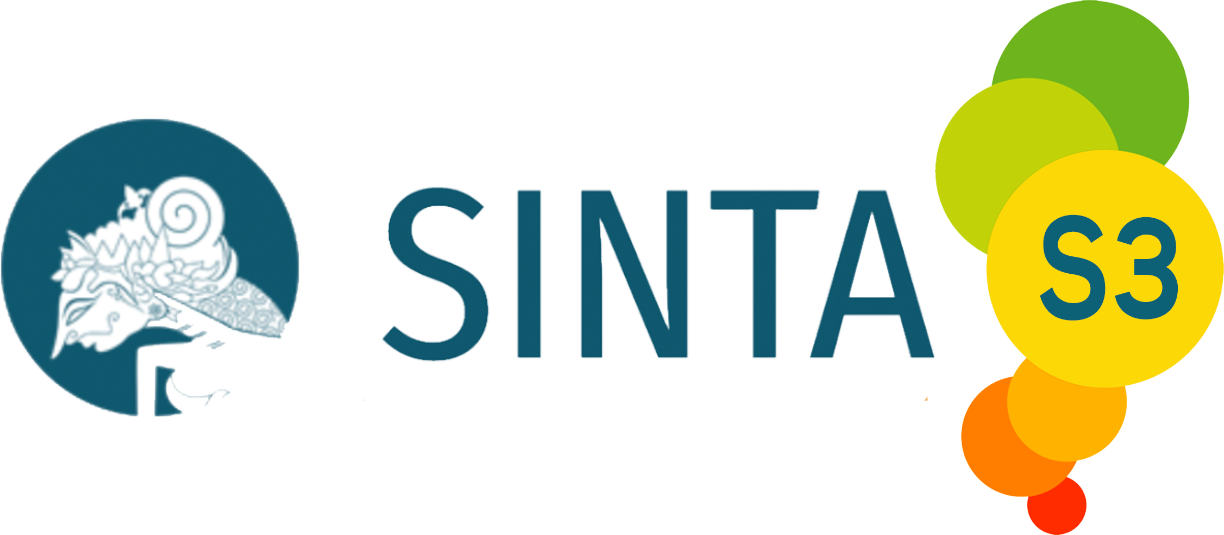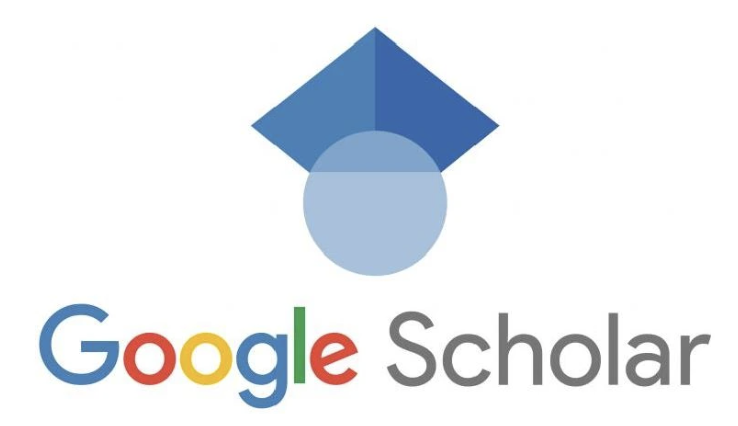Hubungan antara tingkat pendidikan ibu dan disiplin belajar terhadap prestasi belajar IPS siswa sekolah menengah pertama di Kota Mungkid, Kabupaten Magelang
DOI:
https://doi.org/10.21831/jipsindo.v8i1.39124Keywords:
tingkat pendidikan, disiplin belajar, prestasi belajar IPS, Kota MungkidAbstract
Tingkat pendidikan orang tua yang baik mampu membimbing dan mengarahkan puteranya dalam mengikuti kegiatan belajar di sekolah. Tujuan penelitian untuk mengetahui (1) hubungan tingkat pendidikan ibu dengan prestasi belajar IPS peserta didik SMP di Kota Mungkid, Magelang; (2) hubungan antara kedisiplinan belajar dengan prestasi belajar IPS; (3) hubungan tingkat pendidikan ibu dan kedisiplinan belajar terhadap prestasi belajar IPS. Penelitian menggunakan metode penelitian kuantitatif jenis korelasional. Sampel penelitian siswa kelas VII dan VIII SMP Negeri 1 Kota Mungkid sebanyak 182 orang. Teknik pengumpulan data menggunakan kuesioner dan dokumentasi. Hasil penelitian menunjukkan bahwa: (1) terdapat hubungan positif dan signifikan antara tingkat pendidikan ibu dengan prestasi belajar IPS (rhitung: 0,458 > rtabel: 0,148); (2) terdapat hubungan positif dan signifikan antara disiplin belajar siswa dengan prestasi belajar IPS (rhitung: 0,383 > rtabel: 0,148); (3) terdapat hubungan positif dan signifikan secara bersama-sama tingakat pendidikan ibu dan disiplin belajar siswa terhadap prestasi belajar IPS (Fhitung: 24,796 > Ftabel: 3,05).
The relationship between the level of maternal education and learning discipline on the social studies learning achievement of junior high school students in Mungkid City, Magelang Regency
A good level of parental education proficient able to guide and control their sons in participating in learning activities at school. This research aims to determine (1) the relationship between the level of maternal education and the social studies learning achievement of junior high school students in Mungkid City, Magelang; (2) the relationship between learning discipline and social studies learning achievement; (3) the relationship between mother's education level and learning discipline on social studies learning achievement. This research uses correlational quantitative research methods. The sample of the research was 182 grade students of SMP Negeri 1 Mungkid City. Data collection techniques using questionnaires and documentation. The results of this study indicate that: (1) there is a positive and significant relationship between maternal education level and social studies learning achievement (rcount: 0.458> rtable: 0.148); (2) there is a positive and significant relationship between student learning discipline and social studies learning achievement (rcount: 0.383> rtable: 0.148); (3) there is a positive and significant relationship together with the level of maternal education and student learning discipline on social studies learning achievement (Fcount: 24.796> Ftable: 3.05).
References
Cholifah, T., N., Degeng, I.N.S., & Utaya, S. (2016). Pengaruh latar belakang tingkat pendidikan orang tua dan gaya belajar terhadap hasil belajar siswa pada kelas IV SDN Kecamatan Sananwetan Kota Blitar. Jurnal Pendidikan, 1(3) 87-98.
Dewantara, K., H. (1962). Pemikiran Ki Hajar Dewantara. Penerbit Tamansiswa.
Dimyati & Mujiono. (2013). Belajar dan pembelajaran. PT. Rineka Cipta.
Djamaroh, S., B. (2002). Strategi belajar mengajar. Rineka Cipta.
Hoessein, B. (2000). Prospek resolusi kebijakan dan implementasi otonomi. Elex Computindo.
Inawati, A. (2014). Peran perempuan dalam mempertahankan kebudayaan Jawa dan kearifan lokal, Musawa, 13(2), 195-206.
Milhani, Y. (2017). Keefektifan model pembelajaran students team achievement division dalam pembelajaran IPS di SMP Negeri 15 Yogyakarta, JIPSINDO, 4(2), 101-128. https://doi.org/10.21831/jipsindo.v4i2.17571
Saefullah. (2012). Psikologi perkembangan dan pendidikan. Pustaka Setia.
Saliman. (2015). Bentuk-bentuk kenakalan siswa SMP di Yogyakarta. JIPSINDO, 2(2), 179-201. https://doi.org/10.21831/jipsindo.v2i2.7781
Shobri, M. (2017). Strategi meningkatkan mutu pendidikan di Madrasah Aliyah Hasan Jufri, Jurnal Studi Keislaman, 3(1), 56-67.
Slameto. (2010). Belajar dan faktor-faktor yang mempengaruhinya. PT. Rineka Cipta.
Sukardi. (2003). Metodologi penelitian pendidikan: Kompetensi dan praktiknya. Bhumi Aksara.
Sukmadinata & Syaodih, N. (2007). Landasan psikologi proses pendidikan. PT. Remaja Rosdakarya.
Sunain. (2017). Pengaruh tingkat pendidikan orang tua terhadap tingkat kecerdasan dan keaktifan siswa dari kelas satu sampai dengan kelas enam pada semester 1, Jurnal Pendidikan, 6(2), 47-60.
Supardi & Widiastuti, A. (2014), Pemanfaatan laboratorium IPS SMP, JIPSINDO, 1(2), 141-160. https://doi.org/10.21831/jipsindo.v2i1.2886
Syah, M. (2017). Psikologi belajar. Rajagrafindo Persada.
Tirtahardja, U., & Sulo, L. (2012). Pengantar pendidikan. Rineka Cipta.
Toffler, A. (1982). The future shock and the third wave. Bantam Books.
Downloads
Published
How to Cite
Issue
Section
License
Authors who publish with this journal agree to the following terms:
- Authors retain copyright and grant the journal right of first publication with the work simultaneously licensed under a Creative Commons Attribution License that allows others to share the work with an acknowledgement of the work's authorship and initial publication in this journal.
- Authors are able to enter into separate, additional contractual arrangements for the non-exclusive distribution of the journal's published version of the work (e.g., post it to an institutional repository or publish it in a book), with an acknowledgement of its initial publication in this journal.
- Authors are permitted and encouraged to post their work online (e.g., in institutional repositories or on their website) prior to and during the submission process, as it can lead to productive exchanges, as well as earlier and greater citation of published work (See The Effect of Open Access).

JIPSINDO (Jurnal Pendidikan Ilmu Pengetahuan Sosial Indonesia) is licensed under a Creative Commons Attribution-ShareAlike 4.0 International License.
Based on a work at https://journal.uny.ac.id/index.php/jipsindo.













